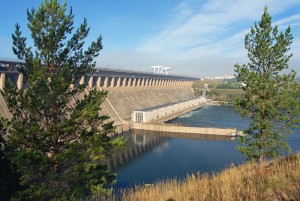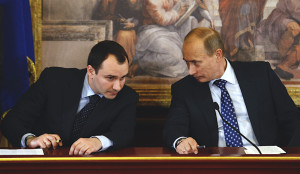
Hydroelectric power plants – gigantic dams across the country’s biggest rivers that supply cheap energy to entire Russian regions and their extremely energy-intensive industrial enterprises – used to be one of the key symbols of the Soviet Union’s industrial might. Up to this day, Russia’s hydroelectric power plants have been cumulatively providing around 20 percent of the country’s energy.
Out of more than 100 major hydroelectric power plants, with the total number of them in Russia reaching almost 200, most are owned by RusHydro PJSC that was founded as a public company by chief architect of the Russian privatization, Anatoli Chubais. However, the state still owns 67 percent of the company’s shares. Another three major hydroelectric power plants belong to En+ Group controlled by Oleg Deripaska who is also president of the world’s second largest aluminum company Rusal. Deripaska’s interest toward hydroelectric power industry is not surprising since aluminum production is a highly energy-consuming process, and Rusal uses most of the electricity generated by Deripaska’s hydroelectric plants. Deripaska’s Russian assets can be considered private only nominally. A classic Russian oligarch of the 1990s, Deripaska is well-known for a statement he made in his 2007 interview to the Financial Times: “If the state says we need to give it up, we’ll give it up. I don’t separate myself from the state. I have no other interests.” Since in recent years global demand for aluminum has been steadily decreasing, Deripaska has no plans to extend his energy assets. As to the situation with RusHydro, its future is less clear. What is obvious that it shows much more signs of corruption and lack of professionalism.
Just as the rest of state-controlled companies, RusHydro can afford a lavish lifestyle thanks to its access to state budget resources. Thus, one day, the company declares its intention to acquire shares of RAO ES East that controls energy systems of economically depressed regions of Russia’s Far East; another day, it announces its plans to put into operation hydroelectric plants from a project that dates back to the Soviet times; yet another day, on prime-minister Medvedev’s initiative, the company decides to allocate billions of rubles to set up investment funds. Monthly wages of RusHydro’s top managers are close to those of Gazprom and Sberbank management and reach $200,000 which is a nice feeding trough for Putin’s friends and family members. For example, RusHydro’s board of directors includes Boris Kovalchuk, a son of Putin’s close friend and member of Ozero cooperative Yuri Kovalchuk.
As a result of criminal negligence of RusHydro’s top management, 75 people were killed in an accident that happened seven years ago at the Sayano-Shushenskaya hydroelectric power plant. However, the “cause” of this tragedy has somehow not yet been established. It seems that RusHydro should be interested in improving safety on its technologically complicated and morally obsolete sites. However, in late June, RusHydro reclined a proposal of the Russian Ministry of Economic Development to establish a “safety council.” According to the corporation, the “creation of additional mechanisms seems superfluous.”
Despite global hydropower potential due to a long-standing concern about carbon dioxide emissions and regular meetings and seminars covering this topic, there seem to be no obvious plans to develop the hydroelectric power industry in Russia.
Just for comparison, in the US and Canadian hydropower-based energy systems electricity prices have been decreasing and, as of today, are actually almost twice as low as in Russia. The common explanation based on different climate conditions does not work in this case since first, Russia’s hydropower potential is one of the world’s biggest, and second, Canada is not further south than Russia.

Russia has one option though, and unfortunately, as in many other cases, it consists in changing the state policy. Instead of being divided between Putin’s friends and family members, budget resources should be used to carry out a technical upgrade, renovation and safety upgrade of hydroelectric power sites. Meanwhile, members of Ozero cooperative, who claim to be proudly leading Russia toward its bright future, build their palaces as far from obsolete hydropower plants as possible. Just in case.





